#Anne Boleyn Fiction
Text
Story sharing Monday
Dulwich Picture Gallery; Supplied by The Public Catalogue Foundation
Go to my link to experience a unique voice. I don’t mean the writer’s actual voice when she reads her original flash fiction story out loud, I mean the narrative voice of the story, the way the storyteller is conveying her reality, her perceptions and belief.
I hope you enjoy it. I did. It’s fun to listen to as well as read. I…
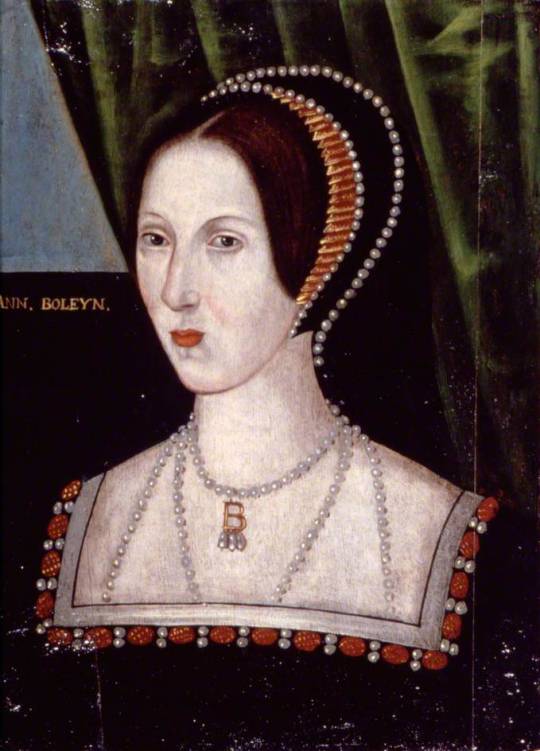
View On WordPress
0 notes
Text
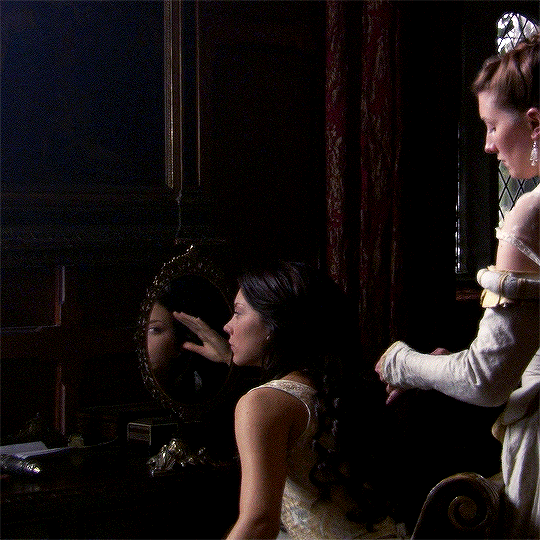
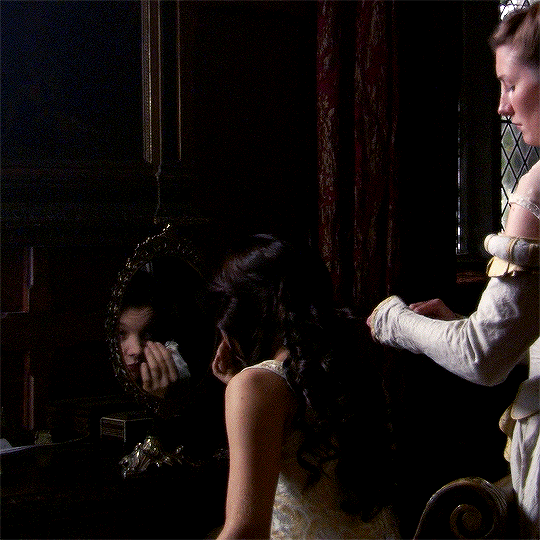
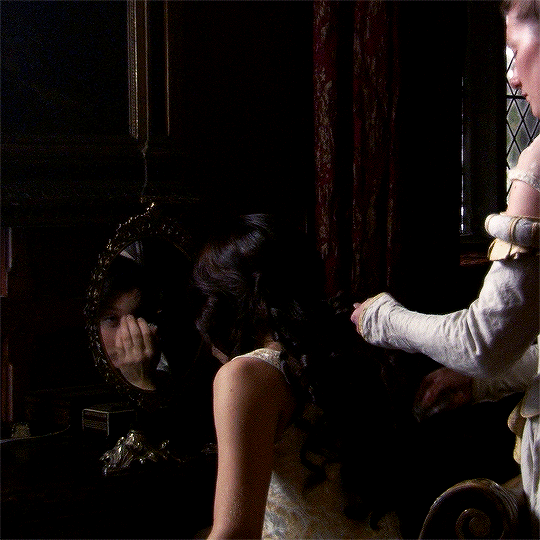
anne in her girly activities 💅🏼🎀
Natalie Dormer as Anne Boleyn
in The Tudors — 1x07 'Message to the Emperor'
#anneboleynedit#anne boleyn#weloveperioddrama#onlyperioddramas#periodramaedit#period drama#tudorerasource#byfefa#mine#natalie dormer#the tudors#tudor era#historical fiction
253 notes
·
View notes
Text
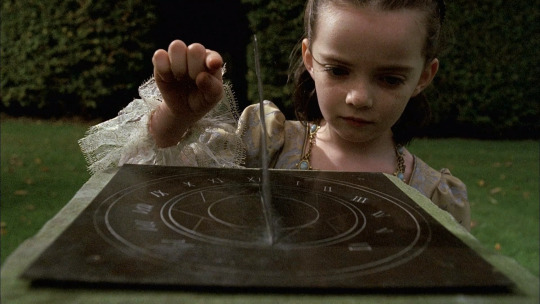

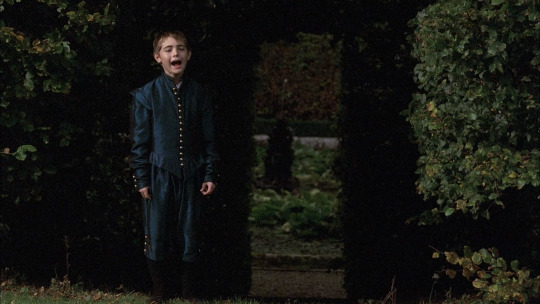
The Tudors (2007) / Queenbreaker (2016), by Catherine McCarran
#anne boleyn#george boleyn#the tudors#web weaving#the idea of them being twins has been coming up a lot more frequently in tudor fiction recently; i've noticed...
21 notes
·
View notes
Note
Alicent would HATE Anne Boleyn, a reformist who helped instigate the break from Rome and the Catholic church, and would call her the “concubine”, “whore”, she-devil”, “Jezebel”. Alicent would call Elizabeth a “bastard” and would support Katherine of Aragon, the pious, loyal and dutiful wife, a daughter of Isabella the Catholic.
Anne was everything that the ideal woman at that time wasn’t meant to be. She wasn’t submissive, she wasn’t meek, she wasn’t somebody who withheld her emotions, she was bold, she was very outspoken, she was emotionally demonstrative, probably emotionally sort of rather immoderate and rather extreme and not at all retiring, very assertive. And I think ultimately somebody who wanted to be in control of her own destiny; in that way makes her quite modern. I love her speech at her trial, in which she describes her one “crime” as not having shown Henry enough “humility”. I think that’s an extraordinary, “feminist” insight for a woman of her time. “I confess I have had jealous fancies and suspicions of him, which I had not discretion enough, and wisdom, to conceal at all times”, she recognized that she had transgressed against the norms of wifely behavior, that she didn’t remained in her proper place. To describe her as a feminist would be an anachronism, but she did step over the ever-moving line that marked the boundary of the comfort zone for men of her era, stepping right into the epicenter of politics during a volatile, dangerous time.
What’s up with Alicent’s stans trying to force nonsensical parallels between her and controversial & challenging women (Anne Boleyn, Medea, Clytemnestra, etc) ? Who’s next, Scarlett O’Hara, Anna Karenina, Hester Prynne ? I thought Alicent was the Virgin Mary who never did anything wrong and whose only character trait is suffering.
Answer to this post?
Again, haven't gone into any real depth with Anne Boleyn, but these sound convincing from what I do know of her. You really got me with the supporting Catherine of Aragon bit, because...whoo, Alicent would.
#asoiaf asks to me#anne boleyn#alicent hightower#fiction vs reality#english history#medieval history#european queens
29 notes
·
View notes
Text
Been reading a lot of those SIX reunites with their kids fics and hinestly I just can’t see Anne suddenly being a mother for Elizabeth. We have to remember that this is Musical!Anne, she doesn’t act very mature (wether you consider that to be an act or not is on you) and doesn’t seem to mind her daughter a lot. Lina talks about Mary and how she was one of the most important people in her life (so much so she treats not seeing her as one of the lowest points of her life [even if a bit comedically]) and half of Jane’s song is just talking about Edward, but Anne mentions Elizabeth once and just doesn’t convey much emotion except for “yeah, I kind of just died because she was girl [insert beheaded joke]”, and while, yes, Anne did choose to die so Elizabeth could rule one day I think Musical!Anne would maybe be kind if bitter about that? The amount of times she mentions dying cannot be healthy, she’s certainly not dealing well with it and she only did it for her daughter who, in this version, she doesn’t seem to really think much of.
I’d personally write a Anne-Elizabeth relationship as really strained. Eliza grew up with this idea of her mother from very biased sources, but from things like the letter, necklaces and the ring we can assume that she never listened to those people and was somewhat fond of this woman she barely remembered, but the thing with being fond of people you don’t know is that you usually end up idolizing them, and Anne, she died for her daughter’s right to the throne and absolutely regretted it. She was still moved around from the line of succession multiple times and was granted this right because of Catherine Parr and Henry, her efforts meant nothing, and now she’s meeting this kid who has incredibly high standards of who she’s suppsoed to be and she just doesn’t want to live up to them. Anne doesn’t want to be an amazing, kind, smart and perfect woman, she wants to be normal and not be reminded of Henry every second of her life because of a kid. She doesn’t need or want that responsibility because she knows that she’ll fuck it up.
At the end of the day literally all of the next wives also raised Eliza to some level. Jane when Anne had just died, Anna ended up becoming an important role model for her and Edward, Kathryn and her seemed to get along mildly well and Catherine Parr literally took her in (despite having a gross husband), so even with a rocky relationship with Anne Elizabeth would still have meaningful mother figures to take care of her in those AUs.
#anne boleyn#elizabeth i#this is musical only#i cant stress this enough#six the musical#its fiction mixed w reality dont use it as proof#for any real life relationships or events#its a personal expansion of the six verse based off on real events#but still mostly fiction#anyway#six#six broadway#txt post#six the kids#elizabeth tudor#queen anne boleyn
20 notes
·
View notes
Text
Do I want Anne Boleyn to come down from heaven to Haunt The Shit Out Of Thomas Cromwell in any Tudor Period Drama? Yes.
#something something also two people in love with the same man/true love of the same man#(absolutely in The Tudors they had Chemistry etc)#i am a tom cromwell enjoyer and blorbo woobying (fictional version)#but also I am above all an Anne Boleyn girlie and a ‘yeah he did all that shit’ person#(i just think Anne should be able to haunt him Once like)#lil and her anne boleyn feelings
12 notes
·
View notes
Text
I used to believe Mary Boleyn and Thomas from Wolf Hall had the potential to be a wholesome thing, but after realizing that she had intended to baby trap him with someone else's child, i cannot look at it the same way.
And it really got me thinking about Mary Boleyn as a character who just happens to use Thomas the same way others do. And that perhaps she's no different than her sister when it comes to Thomas.
Mary is usually categorized as the 'kinder' Boleyn, which makes sense given how she's written. But then there's that line about the Boleyn's using everyone. And that applies to Mary Boleyn too.
I don't believe she loved Thomas. She was interested in him the same way a cat was interested in a mouse, and I think what made it worse is that he couldn't see through it, and she was great at it.
She wanted to marry him knowing he'd face the wrath of her family, knowing she was already pregnant with someone else's child that was not Thomas's, and knowing it could end him.
She was open with her affections towards him, where people could see. Where he could be compromised because he is is of low birth.
Where he could have almost killed man, and Mary shows absolutely no remorse for any of this.
Mary was looking out solely for herself and her children, never Thomas. And while that's not a bad thing, or not unexpected, it just not talked about. And it doesn't mean she gave af about him.
I think the narrative tends to project that manipulative and "evil" stereotype on Anne Boleyn, but at least she's open with her intentions when it comes to Thomas. She has never been dishonest with him in what she wants, and her rise to power assured his as well.
That's not the same with Mary and Thomas. Anne, at the beginning at least, thought of Thomas's wellbeing. Mary never did.
I could argue that Mary treats him almost worse than Anne does.
7 notes
·
View notes
Text
“O death, rock me asleep,
Bring me to quiet rest,
Let pass my weary guiltless ghost
Out of my careful breast.
Toll on, thou passing bell;
Ring out my doleful knell;
Let thy sound my death tell.
Death doth draw nigh;
There is no remedy.
My pains who can express?
Alas, they are so strong;
My dolour will not suffer strength
My life for to prolong.
Toll on, thou passing bell;
Ring out my doleful knell;
Let thy sound my death tell.
Death doth draw nigh;
There is no remedy.
Alone in prison strong
I wait my destiny.
Woe worth this cruel hap that I
Should taste this misery!
Toll on, thou passing bell;
Ring out my doleful knell;
Let thy sound my death tell.
Death doth draw nigh;
There is no remedy.
Farewell, my pleasures past,
Welcome, my present pain!
I feel my torments so increase
That life cannot remain.
Cease now, thou passing bell;
Rung is my doleful knell;
For the sound my death doth tell
Death doth draw nigh;
There is no remedy.”
— Anne Boleyn, 488 years ago.
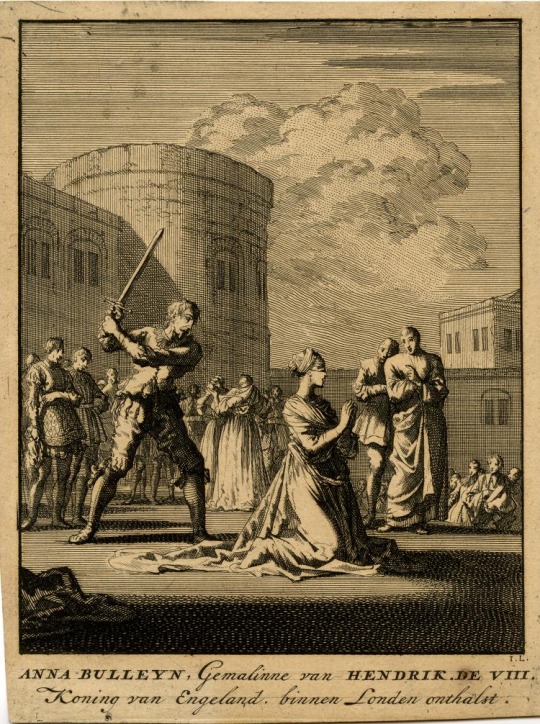
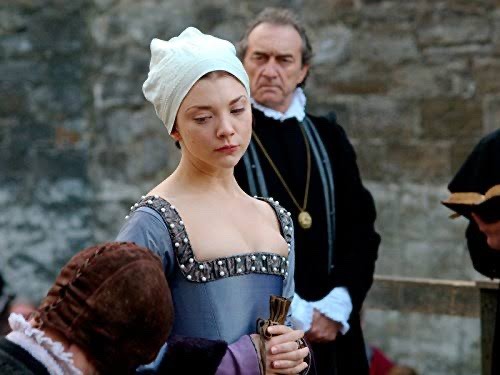
On this day, May Nineteenth, four hundred and eighty-eight years ago, Anne Boleyn was executed in scaffold in the Tower of London.
Painting: Anne Boleyn's Execution by Jan Luyken
#anne boleyn#queen anne boleyn#era Tudor#the tudors’ lacked Anne’s blindfold but dormer’s still my fav fictional portrayal of Anne#rip Anne Boleyn
7 notes
·
View notes
Text
"Not only is the narrative of Henry VIII and his six wives still relevant to twenty-first-century teenage girls, ghostly remnants of those narratives play themselves out in the present: girls are still either harmed or discarded by their boyfriends, and still variously rewarded or punished for their performance of femininity. If history repeats itself, perhaps its ability to signify only amplifies."
Stephanie Russo, "Contemporary Girlhood and Anne Boleyn in Young Adult Fiction," pp. 29.
#anne boleyn#stephanie russo#girlhood#henry viii#history#historical fiction#house of tudor#tudor dynasty#tudor era#tudor period#women's literature#women's history#royal history#english history#early modern history#*quotes
7 notes
·
View notes
Text
The trouble with histfic is even when it's good you'll be vibing and then come across a stupid stupid mistake that makes you want to tear your hair out.
17 notes
·
View notes
Text
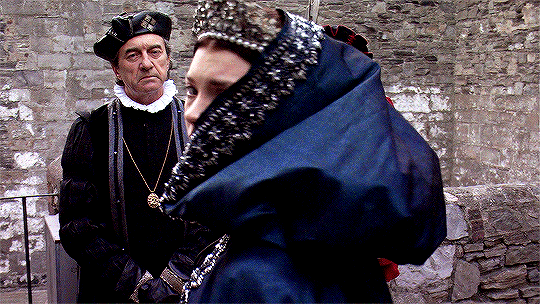
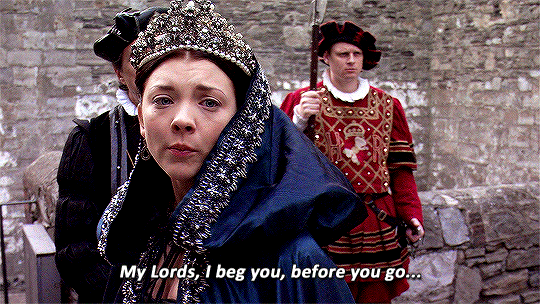
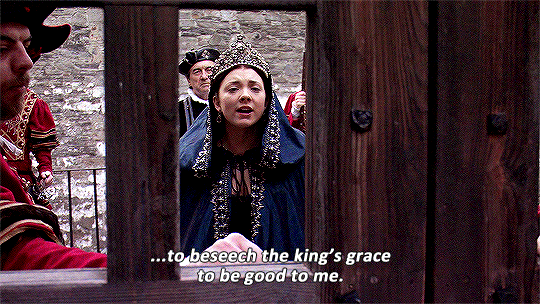
Anne boleyn is arrested and imprisoned in the Tower of London on charges of adultery, incest and witchcraft
𝕹𝖆𝖙𝖆𝖑𝖎𝖊 𝕯𝖔𝖗𝖒𝖊𝖗 as 𝕬𝖓𝖓𝖊 𝕭𝖔𝖑𝖊𝖞𝖓
in 𝕿𝖍𝖊 𝕿𝖚𝖉𝖔𝖗𝖘 — 2x09 'The Act of Treason'
#anne boleyn#anneboleynedit#the tudors#weloveperioddrama#onlyperioddramas#tudorerasource#natalie dormer#userzil#userlenna#tuserjen#period drama#historical fiction#mine#byfefa#If you ever want me to tag you in my future edits#just let me know. I'd be happy to do so! ♡
247 notes
·
View notes
Text
the marvel how-can-i-shoehorn-more-stuff-about-medieval-queens-into-this-fanfiction universe
#'medieval' here used as a shorthand for a period that also covers early modern#that untitled sifki sequel may or may not have another 'btw her maids totally know her menstrual cycle' moment in it#i know the readers LOVE those#(they don't. i assume?)#and the frostmaster 'anne boleyn' thing is gonna open with a Very Tasteful bit of neck-admiring#i've actually been branching out a bit in my readings though. i even read one about a KING recently. one written by A MAN even :O#tho i still favour my kindle categories of 'dead queens (uk)' 'dead queens (not uk)' and 'historical women (not queens tho)'#see? i read upon diverse historical topics. (or 'divers' as the primary sources would have it.)#btw if anyone can rec a non-fiction book in english about wu zetian i'd be forever grateful thanks in advance
7 notes
·
View notes
Text
I had just finished reading Brandy/Emily Purdy's book The Boleyn Bride, a book about Elizabeth Boleyn, Anne's mother and her rendition of Anne Boleyn has got to be one of the most unsympathetic Anne's I had ever read and that includes Philippa Gregory's The Other Boleyn Girl . I don't also like the way George is portrayed in that book. He is more like Anne Boleyn's personal teddy instead of a character in his own right.
4 notes
·
View notes
Text
Some thoughts I have on historical fiction
As a history/theatre double major, I spend a lot of time thinking about historical fiction because it’s the combination of those two things I love the most. And, y’know, I used to be such a purist when it came to historical fiction, but the more I really think about and examine historical fiction, the more I think that it’s level of historical accuracy is kind of irrelevant.
Hear me out.
I am an avid consumer of historical fiction in all its forms (movies, TV, novels, stage,etc) and when I really think about all the historical fiction I’ve consumed over my life, I’ve come to realize that historical fiction is more a statement of its own time rather than the time period it’s depicting. Whether writers do it intentionally or not, nothing is ever written in a vacuum so every writer of historical fiction brings the experiences of their life and their time period into their writing.
Since this is an Anne Boleyn blog, I’m gonna use depictions of Anne as my examples. Take the 1969 film, Anne of the Thousand Days. The film primarily depicts Anne’s relationship with Henry VIII from their first meeting to when Anne is executed. Now, setting aside the historical events this film depicts, just think about the film itself and when it was made. It’s a film about the Tudor court but everything about it, from the lighting to the directing and even the actors performances just screams “THIS FILM WAS MADE IN THE 1960S WHEN FILMMAKER’S HAD A VERY SPECIFIC STYLE AND AESTHETIC”. I mean, all you have to do is watch any other film from the 60s (particularly other British films) and then look at AOTD and you’ll think “yep, that’s a 60s film.” And it’s not just the way the film was shot and designed, but also the way it’s written as well. Now, this film was based on a play from the 40s and I don’t know how much of that original play still remains in this film. But look at Anne Boleyn’s characterization—she’s basically a second-wave feminist dressed in Tudor costume. At one point, she freely admits to Henry Percy that she’s not a virgin and that she’d had a sexual experience in France, but more than that, had also had an experience before going to France. If you know your history (which of course you do) then you know that there is absolutely no way an unmarried girl (especially a girl of Anne’s station) living in the 16th century would so openly admit to not being a virgin—especially to a man she hoped to marry! How does she know Henry Percy won’t be disgusted by this and change his mind about marrying her, or even worse, tell people about her past and potentially ruin her reputation? This scene does not seem very appropriate for the Tudor period…but it’s totally on par with the sexually liberated swingin’ sixties!
Let’s look at another example (sorry, I’m terrible at transitions; it’s a comment I frequently get from my history and English professors whenever I write a research paper). Let’s look at Philippa Gregory and, specifically, her novel The Other Boleyn Girl which was published in 2001. The novel is from Mary Boleyn’s prospective but actually covers a lot of the same ground as Anne of the Thousand Days. Despite it having roughly the same plot as AOTD (more or less) it’s radically different, especially when you compare AOTD to the 2008 film adaptation of TOBG. The whole style of filmmaking has completely changed. Whereas AOTD was lit very bright, TOBG is darker. In AOTD, the actor’s performances are very theatrical, often stiff and over the top (which was very much the style then), the performances in TOBG are more toned down and go for a slightly more “grounded” approach. And also just like with AOTD, it’s not just the design of the film that’s different, it’s also the writing. In the novel and film adaptation, Anne is not really likable at all—she’s mean and spiteful and cruel. All she cares about is power and she doesn’t care who she hurts in the process of getting it; she’s even willing to trample on her own sister. And also in this story, when King Henry first uses Mary and then subsequently moves onto Anne without a second thought, rather than the two sisters blaming the man, they fight each other and Henry is exhonorated as basically just a brainless sheep and victim of Anne’s manipulation. This all seems terrible, but when you consider the time in which the novel was written and the film was produced, it’s not really that surprising. Setting aside Gregory’s obvious internalized misogyny, the early 2000s experienced a huge backlash against feminism. I remember growing up in that time and I remember that “feminist” was almost considered a dirty word associated with all sorts of terrible things like man-hating and bra-burning (those things were viewed as bad at the time). Even if you did believe in gender equality, you certainly didn’t express those views for fear of being given the worst label imaginable—feminist. The early 2000s was marked by a huge number of film and TV shows that heavily reinforced stereotypical gender roles and degraded women (let’s not forget, The Tudors was also made in the early 2000s) and the madonna/whore complex was experiencing a renaissance (if it ever really wained).
So, when we think about historical fiction, what does it really matter if it’s accurate or not? Don’t get more wrong, I am fully aware of the dangers of inaccurate historical fiction, especially when those inaccuracies reinforce old myths or stereotypes that can be harmful. But if someone chooses to take historical fiction at face value and accept everything they see/read as being totally factually correct, isn’t that kind of their own fault? If someone watches a violent film and then goes on a killing spree, do we just shrug and say “oh well, that person watched a violent film so of course they committed this act of violence” or do we hold that person accountable for their actions and not blame the film because correlation does not equal causation? Like I said earlier, I’m an avid consumer of historical fiction but I have never once walked away from a film or novel and thought “well I saw it in this movie so it’s obviously the truth, no questions asked.”
So when we’re looking at and critiquing historical fiction, how historically accurate it is should be the least of our concerns. People focus so much on the “historical” aspect that they completely forget the “fiction” part.
#ugh god i think way too much about this#historical fiction#anne boleyn#anne of the thousand days#the other boleyn girl#essay#thoughts
12 notes
·
View notes
Note
Anne Boleyn and Alicent (either in F&B or HOTD) are NOTHING alike. Anne disrupted social order. Alicent represents the status quo. Anne is an “heretic” and a “whore”, Alicent represents order, tradition, conservatism. Anne is the most influential and important queen consort England has ever had and changed the country forever. No one mentions Alicent when they talk about the Dance of the Dragons.
“Anne Boleyn is one of the most controversial women in English history; we argue over her, we pity and admire and revile her, we reinvent her in every generation. She takes on the colour of our fantasies and is shaped by our preoccupations: witch, bitch, feminist, sexual temptress, cold opportunist. She is a real woman who has acquired an archetypal status and force, and one who patrols the nightmares of good wives; she is the guilt-free predator, the man-stealer, the woman who sets out her sexual wares and extorts a fantastic price. She is also the mistress who, by marrying her lover, creates a job vacancy. Her rise is glittering, her fall sordid. God pays her out. The dead take revenge on the living. The moral order is reasserted.”
https://href.li/?https://www.theguardian.com/books/2012/may/11/hilary-mantel-on-anne-boleyn
Anon's talking about this post.
This is an interesting way to talk about it. Thanks, anon.
#asoiaf asks to me#anne boleyn#european history#european queens#fiction vs reality#fire and blood#alicent hightower#alicent's characterization#fire and blood characters
9 notes
·
View notes
Photo

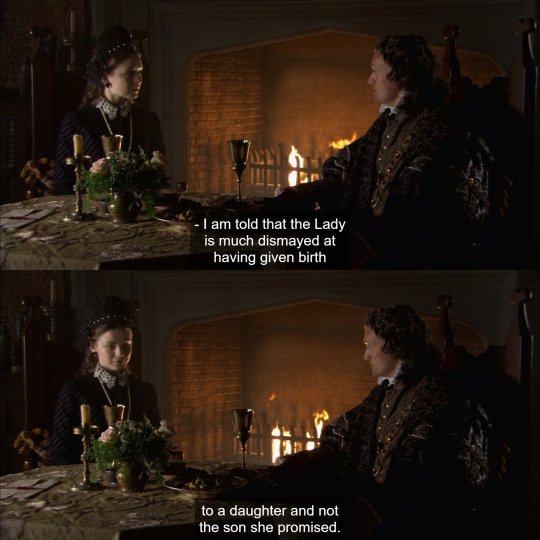
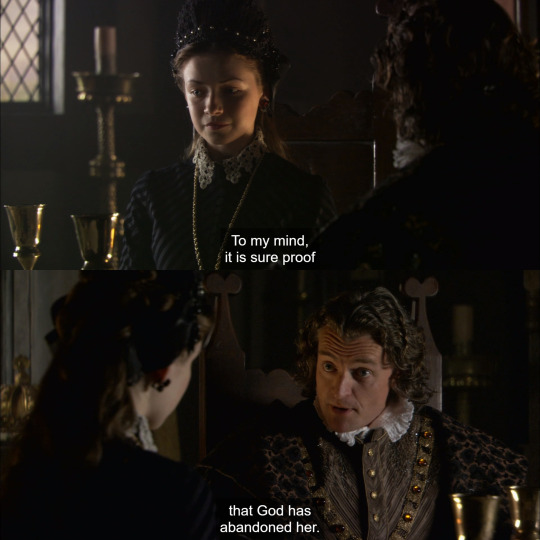

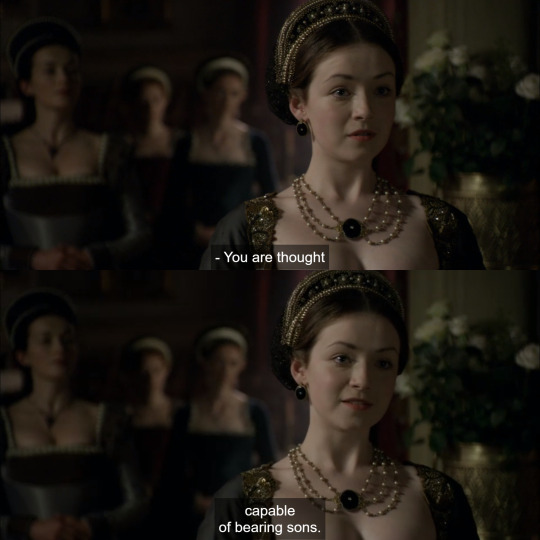

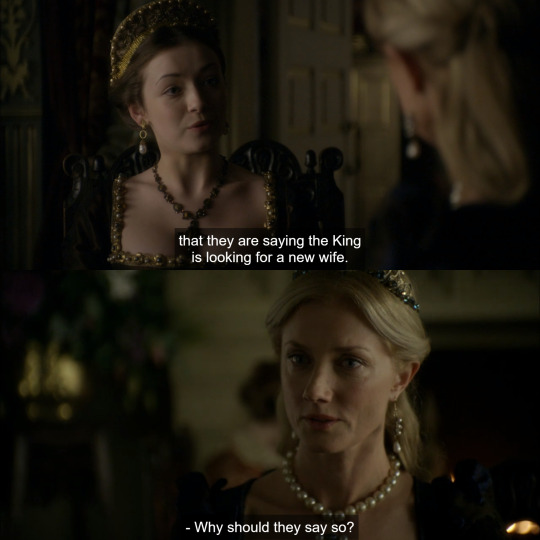

the tudors (2007-2010)
anne boleyn (2021)
bonnie burstow (1992)
#HOW IS MY MOTHER...YK...THAT OTHER WOMAN THAT HAD ONLY A DAUGHTER WHICH IS PROOF GOD HAS ABANDONED HER#ffs chapuys; know your audience!!#anyway tl;dr these are all (obviously) fictional mary's so who knows if she ever expressed these sentiments#but i didn't realize how common a feature this was until i came across the quote#and you know. as you watch them. knowing the fictionalized mary is going to become the historical mary#one can't help but be like damn if this not going to come back to bite in 20 years...#it also had me thinking of the double standards of mary i stans#anne boleyn's stillbirths/miscarriages are how she 'fucked around and found out'#which is not their attitude towards mary's phantom pregnancies#nor should it be. but probably not for either; right?#i think the fact of the matter is it's quite possible mary was never going to have been able to have children even had she married younger#as much as it's possible anne might never have been able to carry any other pregnancies to term#she was really not that 'old' when she married; royal women had had children at 38 and even later#(mary that is)#and if that's true it doesn't mean she had less worth as a human being or that it's...funny? like#(that she never could have carried any pregnancies to term herself; that is)#i'm not sure why they can only see that for one particular women and not any others somehow#maybe we shouldn't be actually applying 16c principles on a woman's worth as we study them. just thinking out loud#or be celebrating the stress and pressures they must have felt cornered by all sides by the expectations of the patriarchal system#within which they had to survive...lol. lmao; even
58 notes
·
View notes